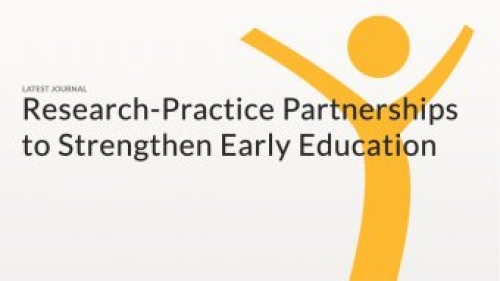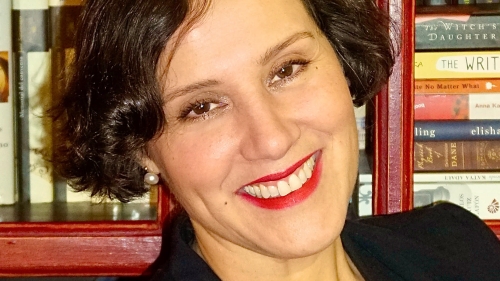
Through its research centers and individual faculty, NYU Steinhardt engages in impactful, forward-thinking work at the intersection of child development and education. One of the current models that stretches across projects and areas of interest is the research-practice partnership, or RPP, in which an organization and a research entity collaborate wholly to improve services and drive systemic change.
Pamela Morris-Perez professor of applied psychology and faculty affiliate at Steinhardt’s Institute of Human Development and Social Change (IHDSC), has worked extensively on research for pre-kindergarten children for two decades. In 2016 Morris-Perez became principal investigator on a $5 million project funded by the Institute for Education Sciences to support the New York City Division of Early Childhood Education at the Department of Education’s (DOE) historic expansion of Universal Pre-K by seeking to understand the impact of teachers’ professional learning on children’s development.
By testing the impact of different professional learning series offered to teachers throughout the city, Morris-Perez, and her colleagues can then assess the outcomes of their students and make suggestions as to how such training makes a difference for classroom quality and outcomes for children.
“Through this RPP, we’ve embedded a research infrastructure into the educational system so that we can help the DOE rigorously seek answers to questions that will help the children in our city, as well as the field of early childhood development,” says Morris-Perez.
This collaboration was captured in detail in a special issue of the Future of Children dedicated to RPPs in early education. Morris-Perez co-led the creation of this issue, as well as contributed to a chapter about how the RPP between Steinhardt and the DOE is allowing the rigorous study of relevant policy questions in ways that would otherwise be infeasible.
“Over the course of our partnership, NYU has supported the DOE by sharing emerging findings in research, lending expertise about methods and measurement tools, and identifying areas well suited for co-designed study within the DOE,” says Morris-Perez. “By identifying components of the system that are working well, as well as areas that could be improved, our co-conducted research provides concrete information for decision-making.”
Morris-Perez. is currently collaborating with faculty from NYU’s School of Medicine and other universities on research to improve parent-child interactions in low-income families through randomized controlled trials in New York City and Pittsburgh.

Latine/x Family Dynamics and Education
Another IHDSC faculty affiliate, Gigliana Melzi, associate professor of applied psychology, looks at the intersection of cultural and linguistic practices as they support early learning and development in children. She focuses on children from low-income, immigrant homes with a Latine/x background where mostly Spanish is spoken at home.
“Most of the work done around kids from marginalized communities is from the ‘glass half empty’ side of things,” says Melzi. “They’re attempting to understand why kids don’t have certain skills, or why parents don’t do certain things. I am more motivated by the ‘glass half full’ attitude: What is present for these children? What skills do they have and what are their parents doing? It’s a way of privileging and centering Latine/x families’ experiences and voices.”
As director of the Culture, Families, and Early Development Lab, Melzi’s work focuses mostly on parent-child interactions. She looks at the unique ways Latine/x families are supporting their children’s reading and learning skills in ways that may be invisible to teachers.
Alongside a colleague at Tufts University and with initial funding from the U.S. Department of Health and Human Services and by the National Institutes of Health, Melzi developed the Parental Engagement of Families from Latino Backgrounds Questionnaire (PEFL)—available in both English and Spanish—to identify some of these differences.
“There are a lot of assumptions that low-Income families, especially those from Latine/x backgrounds, have parents who aren’t involved and don’t have time for their children’s education,” says Melzi. “What we found through a study of 650 families who completed the PEFL is that many Latine/x families have more home-based support for their children—such as narrative storytelling and helping with homework—instead of school-based support—such as volunteering to help in the classroom.”
For Melzi, research in the preschool and pre-K age group is critical.
“It’s the beginning of schooling for young children, and a lot is happening developmentally,” says Melzi. “And, for immigrant families, this is their first foray into an educational system that’s completely new to them, and we know from focus groups that they need additional help to understand how to navigate it.”
Moving forward, Melzi is excited about two new lines of research: an intervention that connects family practices with school practices to positively impact Latine/x children’s reading skills, as well as a cross-university effort to enhance the Development and Research in Early Math Education (DREME) network by investigating the everyday family math talk in Spanish-speaking and Spanish-English bilingual immigrant homes of preschool aged children.

Two-Generation Programming to Break the Cycle
Erin Godfrey, director of the IHDSC and associate professor of applied psychology, is engaged in a partnership with Educational Alliance, a social service provider on the Lower East Side that works with immigrant and low-income families.
“Educational Alliance offers both Head Start and Early Head Start programming for young children, and they started noticing that people they served as kids in these programs were coming back for support for their own children,” says Godfrey. “They realized that something wasn’t working to break the intergenerational cycle of poverty.”
Educational Alliance developed supplemental programming targeted at the parents and caregivers of the young children to work on two generations at once, offering English as a Second Language (ESL) courses, support for applying to colleges and obtaining financial aid, family literacy programming, mental health services, and more.
“My work with Educational Alliance has been to help them evaluate these added programs and understand the benefit they’ve had on the community members,” says Godfrey. “We want to build their capacity to do this work for themselves—to leverage their own data to formulate and answer the questions that are important to them.”
Through Godfrey’s work with Educational Alliance’s data, they have discovered preliminary evidence that the two-generational programming is effective in boosting confidence in helping kids with reading and schoolwork, as well as in increasing attendance in the Head Start program.
Godfrey is also working with Chris Barker, associate director at IHDSC, to grow a larger RPP between Educational Alliance and IHDSC to bring together more faculty and more programs. Currently, the two are collaborating on a research study about how the benefits available to families under the poverty line within the American Rescue Plan Act of 2021 are being accessed and utilized.
For Godfrey, the RPP represents an important model for the future—not just in early childhood education, but across fields and industries.
“In an ideal RPP, the ideas don’t come from academia to be applied to people in the real world; the questions and interest is generated from within, and academia helps make it happen,” says Godfrey. “RPPs represent an important way to make change in applied social problems.”
